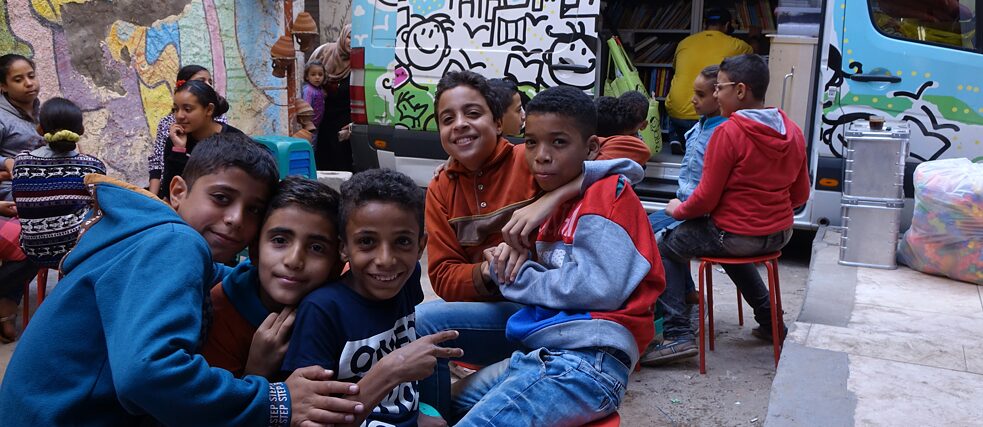In a society where the book is usually presented as only for learning and with high rated of poverty and illiteracy; many children cannot find a good chance for exploring a new methods of learning. Here, you can see the huge effective impact of a project like the "library bus" has achieved in Egypt.
With chairs, tables, TV screen, drawing tools, DVDs and a large number of books- most of them in Arabic, the library bus visited its first station in the Nile delta in 2013, where there is a great need for a mobile library, due to the high population and partly inadequate infrastructure.
The project was launched by the Goethe- institute as part of their programme "transformation partnership"- which is called now “ta'ziz”- in the Middle East and North Africa, funded by the German Federal Foreign Office.
In the front seats, the driver sits, next to him is Haitham Shokry, the storyteller and the coordinator of the project. In every station, they encouraged children and young people to read and to show that the book is not only for learning and exams but can also be very interesting in daily life.
For five years, the bus expanded in its activities and stop stations, heading to Upper Egypt in the south as well, covering thousands of kilometers between remote villages and cities, represented a different world for the children and young people, whether they are school students or even school dropouts, and encouraged them to spread the “reading culture" which could help them to improve their daily life and their prospects for the future.
The project relied on cooperation with local partners who helped in choosing the stop areas for the bus and complete the necessary permits for the project. They were also very important to reach children in schools, youth centers, orphanages or even children hospitals.
"Abu Manjouj" village, one of the stations the bus had visited. It is about an hour and a half away from the nearest public library, which is very difficult for a children to visit alone or even with his\her parents due to their low economic levels. So the "library bus" was the only and first chance for the children in this village to read, and this explained why whenever the bus arrived the village, it found a huge attention from the kids.
Walid Abu Al-Saud, the local coordinator at "Al-Rabeeh" Association, the local partner of the project in "Abu Manjouj" village, said that the children were fascinated by the library's activities, and were waiting it every month.
"every time, the bus left the village, they come and asking me When will they come back again"., Walid says.
He adds: "They learned a lot of values in a friendly atmosphere. I noticed by myself the impact of the project activities in their behavior, their imagination and intelligence."
The high number of participants who reached more than 60 thousands not only from children and young people but also parents and teachers, proved the public interest in the project .
“"I could see the children laughing from their hearts", says Afaf El Miniawy, the activities supervisor at Kafr Bahout Youth Center in Dakahlia Governorate.
50-year- old Afaf said she was surprised that the parents in her village brought their children by themselves to attend the activities of the library bus, and this is unusual in her society. Afaf, herself, has benefited from the unconventional methods that Shokry, the bus coordinator, used with the children.
She added, "Parents and teachers themselves were keen to attend the events- even if they were sitting far away, to benefit from the way he interacted with the children."
Although funding for the project stopped at the end of 2017, and it was handed over to "Misr El Kheir" association for its own library bus project, the impact of the bus continues to date.
Afaf said that children and young people who participated with her in one of the bus activities are still visiting the center's library to read new books and still encourage more of their colleagues to read.
